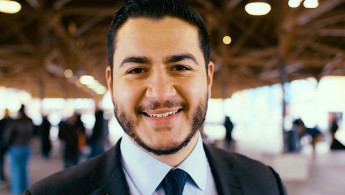Abdul El-Sayed and the changing face of the Democratic Party
On June 26, Alexandria Ocasio-Cortez's primary victory over a 10-term incumbent in New York sent shockwaves through the world of US politics.
The congressman she defeated, Democrat Joe Crowley, was considered by many to be the likely successor to Nancy Pelosi as the Democratic Party leader in the US House of Representatives.
The 28-year-old Ocasio-Cortez pulled off an improbable upset with no political experience or backing from the Democratic establishment. But the biggest upset of the election season may be yet to come.
Abdul El-Sayed, a charismatic 33-year-old physician, is one of the Democratic candidates running for Governor of Michigan. He's unabashedly progressive, a captivating speaker, and a victory for him on August 7 would signal a major shift within the Democratic Party.
If voters considered the candidates in Michigan's gubernatorial race solely based on their credentials and qualifications, El-Sayed wouldn't be much of an underdog. His resume is exceptionally impressive: a Rhodes Scholar with a doctorate in public health from Oxford, he went on to complete medical school at Columbia University. The former Ivy League professor is also recognised as an expert on public health policy.
|
|
|
Although he has never held elected office, El-Sayed served as executive director of the City of Detroit's health department where his tenure was a considered a resounding success. When he assumed the role in 2015, Detroit was recovering from bankruptcy and the department was in shambles after years of state-directed "emergency management".
He implemented several important programmes including testing the lead levels in Detroit Public Schools in the wake of the Flint water crisis.
So why is El-Sayed considered an underdog? He is running a grassroots campaign, rejecting corporate donors and relying on smaller donations from individuals.
One of his opponents, Gretchen Whitmer, is the former Democratic leader of the Michigan senate. Whitmer is regarded as the "establishment candidate" with endorsements from several prominent Democrats.
His other opponent, Shri Thanedar, is a wealthy businessman who has spent millions of dollars funding his own campaign and will continue to outspend him as the August 7 primary approaches.
El-Sayed's strategy is to energise the progressive base in Michigan, much like Bernie Sanders did when he won the state's presidential primary in 2016. Fittingly, Sanders officially endorsed El-Sayed in late July, saying: "As governor, Dr El-Sayed will fight for a government in Lansing that represents all the people, and not just wealthy special interests."
The Trump effect
El-Sayed, the son of Egyptian immigrants, is a practicing Muslim. Right wing extremists including one of his Republican challengers have made a concerted effort to shift the focus from his policy platform to his faith. Earlier this year, Pat Colbeck, Republican candidate for Governor, claimed El-Sayed's family had "ties to the Muslim Brotherhood".
The unsubstantiated claim was part of a larger Islamophobic conspiracy theory he peddled to his supporters. The crux of Colbeck's conspiracy theory is the claim that Muslims seek to implement "Sharia law" in America by obtaining positions of influence. As ridiculous as that might sound, this is the reality of the Trump era, in which - in 2017 alone - there were 14 states that introduced anti-Sharia bills.
Twitter Post
|
During a televised debate, El-Sayed was asked to respond to Colbeck's outrageous claims, taking time away from discussing real issues. This is the reality for many Muslim-Americans running for office.
President Donald Trump narrowly carried Michigan in the 2016 election, becoming the first Republican to win the state since 1988. El-Sayed will be focused on many of the voters who have become disillusioned with establishment candidates: voters who came out for Barack Obama in 2008 but stayed home in 2016.
El-Sayed and Ocasio-Cortez, who recently endorsed him, could give us a glimpse into the future of the Democratic Party, along with Rashida Tlaib - a Palestinian-American running for Congress. Last week, Ocasio-Cortez joined El-Sayed on the campaign trail in Michigan. Their events have drawn huge crowds in Michigan's largest cities, from Grand Rapids to Detroit.
Whether or not he wins, El-Sayed's candidacy is important and much needed in America today. "What has inspired me most is that, having traveled to over 100 cities statewide - including places where there are few people of colour at all, let alone Muslim-Americans - Michiganders are not asking how I pray, but what I pray for - and what I care about," El-Sayed says.
However, at a time when anti-Muslim hate crimes are at an all-time high, his candidacy serves as a repudiation of the xenophobic rhetoric that resonates with Trump's base.
Further to the left
If the energy surrounding El-Sayed's campaign is any indicator, it would seem that progressive platforms once considered "far-left" are becoming more popular. This is especially true among younger voters who support his push for single-payer universal healthcare, legalising recreational marijuana, and free college tuition for students from low income and middle class households.
While he does not identify as a "democratic socialist", he certainly doesn't toe the party line. In fact many of Michigan's top democrats including his former boss, Detroit Mayor Mike Duggan, are endorsing his challenger.
Despite these hurdles, he believes he can win and his campaign has outperformed expectations. From fundraising to filling venues all over the state, El-Sayed has cemented himself as a top contender in the race.
Michigan's current Republican Governor is among the least popular in the country, with his approval ratings tanking after the Flint water crisis.
The timing is great for a candidate with fresh ideas and bold initiatives to take leadership of the state. Regardless of the outcome of the upcoming election, El-Sayed will be a rising star in the Democratic Party for years to come.
Follow us on Twitter: @The_NewArab



![sudan women [getty] sudan women [getty]](/sites/default/files/styles/image_330x185/public/media/images/5019D7F4-52AF-4377-8A05-885D27476479.jpg?h=d1cb525d&itok=tKXV7r-W)